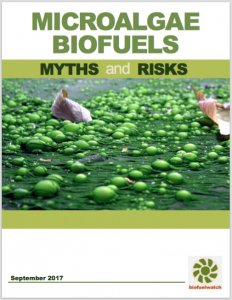Latest in Biotechnology for Biofuels series

September 26, 2017
As the Bio-Based Live Americas conference meets today to discuss topics including industrial scale production of biofuels and chemicals via genetically engineered (GE) microorganisms such as GE algae, a new report suggests that these organisms pose serious environmental and health risks.
Microalgae Biofuels: Myths and Risks and a companion briefing, released today by Biofuelwatch and Friends of the Earth U.S., reveals that even after decades of investment, viable commercial production of algae biofuels has failed and is unlikely to succeed. Meanwhile, genetically engineering microalgae to produce fuels, chemicals and other products poses under-recognized, serious threats to the environment and public health.
“As we are witnessing more frequent toxic algae blooms such as those currently plaguing the Finger Lakes region in New York, it seems particularly unwise to be encouraging mass-scale production and inevitable release of GE microalgae,” said Dr. Rachel Smolker, Co-Director of Biofuelwatch. “Scientists are clear that GE microalgae will inevitably escape from cultivation facilities. Many of the traits that are being engineered to create algal ‘chemical factories’ could result in their outcompeting and proliferating out of control in the wild.”
“Rushing genetically engineered algae into production ahead of safety assessments and oversight could result in serious unintended consequences. These organisms could become ‘living pollution’ that is impossible to recall,” said Dana Perls, Senior Food and Technology Campaigner at Friends of the Earth U.S. “We need a common sense moratorium on the commercial cultivation of GE microalgae, and investment should be redirected toward more promising and sustainable solutions.”
Key findings of the report include:
- Even after decades and millions of dollars in public and private of investment, production of algae biofuels has failed to become commercially viable.
- Genetically engineering microalgae to produce fuels, chemicals, and other products poses serious threats to the environment and public health: invasive algae outcompeting native species, potential for increased harmful algal blooms, and land use impacts from chemical, energy and water intensive feedstock production.
- Several major companies invested in producing genetically engineered algae are turning to low volume, high-value products to remain economically viable, with some such products already on the market, including ingredients for food and consumer products, all of which are derived from GE algae.
- Government agencies, including Department of Energy (DOE) and U.S. Department of Agriculture (USDA), along with various state and private sources, continue to invest heavily in algae biofuels.
- The continued market hype about GE algae biofuels as sustainable, claims of unrealistic productivity, and historic promises of commercial viability just over the horizon perpetuate the myth of a “miracle fuel” and that unsustainable energy consumption may continue “business as usual.”
The report explores the biological and technical barriers to algae biofuel production, providing perspective as to why decades of investment and hype has yet to yield any commercial biofuels. It argues that whether it is for biofuels, “bio-products”, or face creams, the large-scale cultivation of GE microalgae poses unacceptable risks, perpetuates the myth that algae biofuels will provide a viable and substantial alternative to fossil fuels, and diverts attention, funding and resources from safer solutions. The report calls for more sustainable and proven solutions to climate and energy concerns, such as efficiency, solar and wind energy, relocalization, expanded public transportation, and regenerative agriculture.
